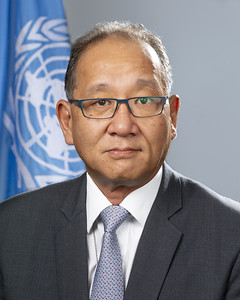Entrepreneurial about Gender Equality

UNITED NATIONS, Oct 01 (IPS) - Hong Joo Hahm is Deputy Executive Secretary and Officer-in-Charge of the United Nations Economic and Social Commission for Asia and the Pacific (ESCAP).Asia and the Pacific needs more women entrepreneurs. Women's economic empowerment and gender equality depend on it, as does the inclusive economic growth needed to achieve the UN's Sustainable Development Goals. This drives a new initiative by the United Nations Economic and Social Commission for Asia and the Pacific, generously supported by Global Affairs Canada, focused on improving women entrepreneurs' access to finance in our region.

But for all this potential, businesswomen face considerable obstacles in Asia and the Pacific. Representation on company boards is lower than in any other region and women CEOs are precious few. Gender bias runs through inheritance, labour and social security laws. Many women work in the informal economy with no social protection and societal prejudice frustrates women's entrepreneurial potential. Across Asia, women give up to six hours of unpaid care work a day: thwarting educational attainment and career prospects.
For women wanting to start or expand a business, access to finance is key. 70 percent of women-owned micro, small and medium enterprises (MSMEs) are underserved by financial institutions in developing countries. Women struggle to borrow in a region where land is required as collateral but where very few are landowners. So women-owned enterprises are consistently smaller and concentrated in less profitable sectors.
To overcome these challenges, the Economic and Social Commission for Asia and the Pacific (ESCAP) is launching a new initiative with generous financial support from Global Affairs Canada. Its goal: to support financing for women entrepreneurs and innovators, improve their access to information and communication technology (ICT), and create a policy environment in which their businesses can flourish. It will give twenty thousand women entrepreneurs greater access to ICT and finance.
ICT and innovative financing lie at the heart of the initiative. We want to support businesswomen mainstream ICT across business operations; to make their financial management more robust and their outlook more responsive to new technologies. We plan to launch "women bonds" for women entrepreneurs, channeling private sector investment from developed markets to support gender equality in the developing world. We will work with impact investment funds to target women-led investments. And encourage financial technology (fintech) solutions through advice on regulatory frameworks, training to help women access fintech services and new credit lines to support innovators.
Deeper gender analysis of the MSME sector will complement these activities. To inform policies which strengthen women's rights and access to justice; reforms which update inheritance and property regimes; and legislation which stops credit being extended according to gender or marital status. For such a broad challenge, we will bring women entrepreneurs and policy makers together, to build a gender sensitive response across policy areas and governments.
The case for investing in women entrepreneurs is overwhelming. They are true agents of change whose innovation can lift communities, companies and countries. We are committed to improving their prospects, to unleashing women entrepreneurs' full potential and putting gender equality squarely at the heart of the 2030 Agenda for Sustainable Development in Asia and the Pacific.
© Inter Press Service (2018) — All Rights ReservedOriginal source: Inter Press Service
 Global Issues
Global Issues